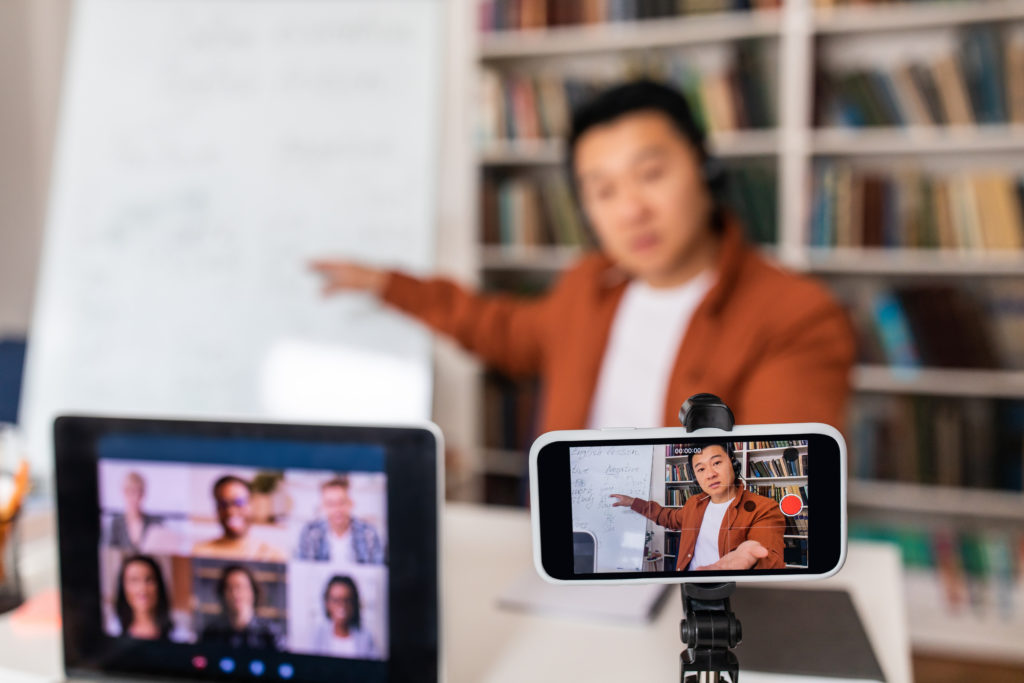Quick Hits
Daily brief research updates from the cognitive sciences

Not so long ago all learning went online – out of necessity.
There has been plenty pf research into differences in online learning and in-person learning but this study by Gellisch et al. at Ruhr-University Bochum looked at different physiological stress responses between online learning and in-person learning.
This study was interesting because it studied the same 82 students in an in-person and online learning scenario. They were attending a blended learning anatomy course that had different groups alternating between online lessons and in-person lessons (the same lessons).
The participants were monitored with heart rate sensors and also cortisol, the stress hormones, was measured by taking saliva samples at the start of the session after 60 minutes and at the end of the two-hour lesson.
What did they find?
They found that the in-person lesson stimulated higher cortisol levels, higher heart rate and lower heart rate variability. This is consistent with a stress response. So, is in-person learning more stressful? Yes, but and this is a big but, this also shows higher stimulation and higher stimulation is generally associated with better memory function and learning,
So, in short online learning is less stressful, more comfortable, but likely less impactful. This not to mention other positive benefits of in-person learning such as bonding with classmates and additional learning opportunities through casual and focused conversations around the course.
What’s more those in the in-person groups reported higher enjoyment of the very same class. So, let’s not write off in-person courses, yet!

Andy Habermacher
Andy is author of leading brains Review, Neuroleadership, and multiple other books. He has been intensively involved in writing and research into neuroleadership and is considered one of Europe’s leading experts. He is also a well-known public speaker, speaking on the brain and human behaviour.
Andy is also a masters athlete (middle distance running) and competes regularly at international competitions (and holds a few national records in his age category).
Reference
Sizhen Su, Le Shi, Yongbo Zheng, Yankun Sun, Xiaolin Huang, Anyi Zhang, Jianyu Que, Xinyu Sun, Jie Shi, Yanping Bao, Jiahui Deng, Lin Lu.
Leisure Activities and the Risk of Dementia: A Systematic Review and Meta-Analysis.
Neurology, 2022; 10.1212/WNL.0000000000200929
DOI: 10.1212/WNL.0000000000200929
More Quick Hits
Breastfeeding Improves Mother’s Cognitive Abilities — Years Later
Quick HitsDaily brief research updates from the cognitive sciences o are you saying that breast feeding is not only good for the infant but also the mother?!Yes, we’ve know for a long, long time that breastfeeding is very good for the infant. Over...
Mothers Can Pass on Stress to Future Generations
Quick HitsDaily brief research updates from the cognitive sciences presume you’re not just talking about stressed mothers stressing out their kids and/or grandchildren?Not precisely. I’m talking about passing on stress activation patterns in DNA...
Learning Before Age Five Can be Seen in the Brain Forty Years Later
Quick HitsDaily brief research updates from the cognitive sciences ducation before age five leaves structural changes to the brain, identifiable forty years later — impressive! This is the beauty of long-term longitudinal studies (the negative side...
Exercise in Childhood Predicts Healthy Brains (into Adulthood)
Quick HitsDaily brief research updates from the cognitive sciences k, we all know by now that exercise is good for you. Many of you may also be more than aware that exercise is a potent stimulator for the brain encouraging brain growth and...
The Surprising Truth of Why Powerful People can be Toxic
Quick HitsDaily brief research updates from the cognitive sciences e’ve all heard the stories of toxic bosses, and powerful people who happily destroy other people’s lives, and show no compassion to those less fortunate than themselves. There is a...
Leadership Behaviours for More Resilient and Effective Teams
Quick HitsDaily brief research updates from the cognitive sciences hat makes for effective and resilient teams is something that interests many leaders and organisations. I have spoken about some of these aspects in other articles, particularly...






